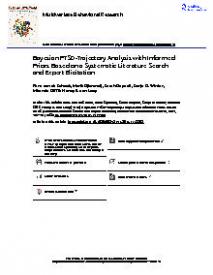Bayesian PTSD-Trajectory Analysis with Informed Priors Based on a Systematic Literature Search and Expert Elicitation
ABSTRACT
There is a recent increase in interest of Bayesian analysis. However, little effort has been made thus far to directly incorporate background knowledge via the prior distribution into the analyses.
This process might be especially useful in the context of latent growth mixture modeling when one or more of the latent groups are expected to be relatively small due to what we refer to as limited data. We argue that the use of Bayesian statistics has great advantages in limited data situations, but only if background knowledge can be incorporated into the analysis via prior distributions. We highlight these advantages through a data set including patients with burn injuries and analyze trajectories of posttraumatic stress symptoms using the Bayesian framework following the steps of the WAMBS-checklist.
In the included example, we illustrate how to obtain background information using previous literature based on a systematic literature search and by using expert knowledge. Finally, we show how to translate this knowledge into prior distributions and we illustrate the importance of conducting a prior sensitivity analysis. Although our example is from the trauma field, the techniques we illustrate can be applied to any field.
In: Multivariate Behavioral Research, ISSN 0027-3171 ; eISSN 1532-7906 | 53 | 2 | 267-291
https://doi.org/10.1080/00273171.2017.1412293


